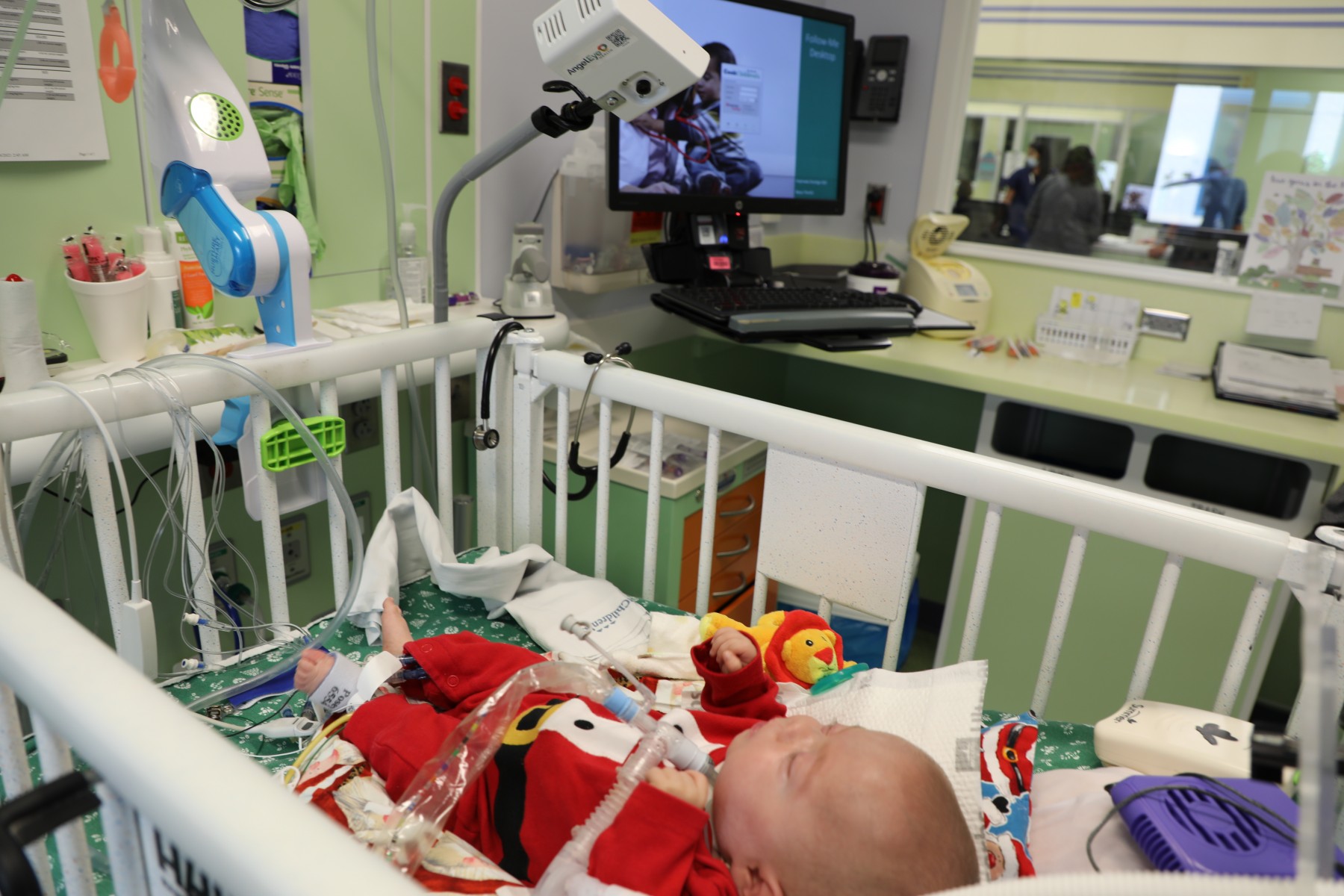New Camera System Allows Families to See Babies Inside Cook Children's NICU
Dressed in a Santa onesie for the holidays, 5 ½-month-old Parker lies in a crib, his arms and legs paddling the air as expressive blue eyes dance back-and-forth between his mom and nurse.
Parker arrived at Cook Children’s Neonatal Intensive Care Unit (NICU) on June 29 for treatment of chronic lung disease and heart defects after being born two-and-a-half months early and weighing 1 pound 10 ounces. A complication with umbilical cord blood flow contributed to his premature birth and development issues.
Since then, Cook Children’s NICU has been home for Parker and his mom, Misty Kent of Brownwood, who stays with him each day and sleeps at the nearby Ronald McDonald House at night. His dad makes the two-and-a-half-hour drive from their family’s home to see him on weekends. But Parker’s grandparents and siblings—two sisters and two brothers, whose ages range from 14 to 21—have seen him only once when his condition worsened to the point that physicians called the family in.
“They got to come up and see him for two hours, but they didn’t get to touch him. He was so little then,” Kent says, glancing at Parker, who now weighs 10 pounds. “It has been a journey, to say the least.”
But a newly installed camera system in the NICU may help ease some of the stress for Parker’s family and others like them—especially with restricted visitation in the pandemic—by giving them a chance to lay eyes on their babies whenever they want. The system, created by AngelEye Health, went live last week, allowing families 24-hour-a-day access to their babies via individual room cameras, says Sheralyn Hartline, RN, and NICU director at Cook Children’s.
Funded by private donors in the community, AngelEye cameras—a total of 106 in the NICU—are set over patients’ beds and turned off only if patients are out of bed or if care is being performed, she says. One access link is given to the NICU patient’s mom, who then can share with other family and friends, Hartline says.
The AngelEye system will benefit the parents and families alike, she says.
“This will allow our parents to go home, get a nice rest and still have the comfort of looking at their baby from home,” she says, adding many of them live out-of-town and face long travel distances. “It’ll allow grandparents and siblings to see the baby, too, because many people haven’t been able to meet the newest family member due to COVID restrictions.”
COVID restrictions limit families to two visitors during an entire NICU stay, Hartline says. An average NICU stay lasts about 20 days, but some patients like Parker remain for months, she says.
“We’re hoping the cameras will help take the place for some of what’s been missing for quite a while now,” Hartline says. “It will allow for some family moments we haven’t been able to have over the past year and a half.”
As soon as the cameras were turned on, it made a difference for Parker’s family, Kent says.
“Our family is over the moon. This morning, as soon as it went live, I sent a link to Parker’s dad and grandma, and they were both on it within two minutes,” she says. “And, of course, grandma cried because she was so excited to be able to see him.”
His siblings also planned seeing him on camera later in the day, she says.
It is unclear how much longer Parker—who needs a tracheostomy tube to breathe and uses a gastrostomy-button for feeding—will remain in the NICU.
“We’re still watching his heart pretty closely,” says Kaitlin Tarver, RN, who works in the NICU.
His heart and lungs might continue to develop on their own in the next couple of weeks, she says, or he may need surgery to repair two holes in his heart before he goes home. In the meantime, they’re placing him on the floor to play on his belly, sitting him up with a support pillow, putting him in a swing or just getting him out of bed to look at the sunshine, Tarver says.
Kent understands the challenges her son faces in the coming weeks.
“He has been here a long time, but we’ve overcome huge obstacles in these six months. We’ll be here for a while longer, but that’s what we need to do to get where we need to be,” she says. “Cook Children’s is one of the biggest blessings we’ve ever had in our lives. If he wasn’t here, he would not be alive.”
And while her son is in NICU, she sees AngelEye cameras as an asset in case she wants to check on him in the middle of the night or if she needed to go home for a school function for one of her children.
“I think people who aren’t in the NICU or who have never had to face this situation might not understand the gravity of it and how this will help people going through it,” Kent says of having room cameras available for families. “If you’ve never been in this situation, it’s hard to grasp. But I can speak to it because I have other children and have never had to deal with this until now. It’s a life-changing event—like your entire life changes.
“So, if you cannot be here for whatever reason, it may give you peace of mind that your child is OK—you can see it with your own eyes,” she says. “It’s a very, very big deal.”
